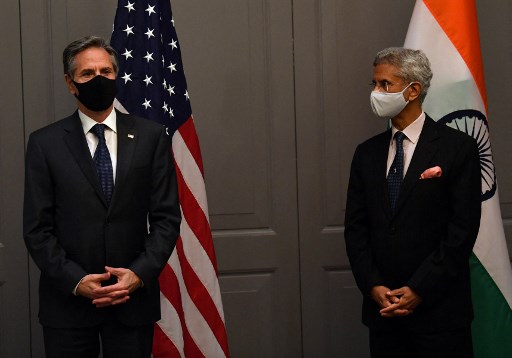
by AFP bureaus
NEW DELHI, India (AFP) — India’s foreign minister was forced to abandon face-to-face G7 meetings on the pandemic in London on Wednesday because he may have been exposed to Covid-19, as the crisis deepened back home with his nation’s daily death toll hitting a record at almost 3,800.
The coronavirus continues to ravage India but in Europe and the United States mass vaccination programmes have allowed the easing of many restrictions.
Foreign Minister Subrahmanyam Jaishankar was in Britain for talks with counterparts from the Group of Seven wealthy democracies but announced he would hold his meetings virtually after possible exposure to virus cases.
India has in recent weeks endured a devastating surge in coronavirus cases, with more than 380,000 infections reported on Wednesday as well as 3,780 deaths.
Experts have warned that case numbers will keep rising until the end of May and could reach 500,000 new infections a day.
In an effort to boost the country’s collapsing health system, its reserve bank announced $6.7 billion in cheap financing for vaccine makers, hospitals and health firms.
“The devastating speed with which the virus affects different regions of the country has to be matched by swift and wide-ranging actions,” Reserve Bank of India governor Shaktikanta Das said.
India’s crisis has been partly fuelled by a lack of vaccines. This has in turn exacerbated the global shortage as India is the world’s biggest producer of Covid shots.
The G7 discussed coronavirus vaccines on Wednesday as pressure grows on the group to share stockpiles and know-how with poorer nations.
India is not part of the Group of Seven wealthy democracies but was invited to the talks by Britain, which holds the rotating presidency of the group throughout 2021.
‘Abundant caution’
However, those talks were thrown into disarray after reports of two cases among the Indian delegation.
He met US Secretary of State Antony Blinken in-person, with both wearing masks, on Monday evening on the sidelines of a foreign ministers summit.
Blinken has already received two vaccine doses. The US State Department said it had been advised that its health protocols “would permit us to continue with our G7 activities as planned”.
Australia controversially responded to the surging cases in India by imposing measures under which Australian citizens returning from the country would face jail time.
However after widespread outrage, a federal court on Wednesday agreed to hear a challenge brought by a 73-year-old man living in Bangalore who wishes to return to Australia.
In Southeast Asia, Malaysia said it will tighten restrictions in capital Kuala Lumpur to combat a surge in infections, which have risen to over 3,000 a day.
Vaccine inequity
The pandemic has claimed more than 3.2 million lives worldwide since it first emerged in late 2019, but many wealthy nations have made progress in suppressing the virus as mass vaccination campaigns gather steam.
A growing campaign has been calling for patent waivers on vaccines so poorer nations can get quicker access.
More than 1.2 billion doses have been administered globally, but fewer than one percent in the least developed countries.
US President Joe Biden said he had not made a decision on whether to support a waiver but that the United States was moving “as quickly as we can” to export doses.
Vaccine shortages are not an issue in the US, which could soon be sitting on as many as 300 million extra doses — nearly equivalent to its entire population.
Biden on Tuesday said he wanted 70 percent of American adults to have received at least one shot by the July 4 Independence Day holiday.
He also said his administration was “ready to move immediately” if regulators authorise the Pfizer-BioNTech vaccine for 12- to 15-year-olds.
But many experts questioned the wisdom of devoting limited vaccine supplies to a low-risk group instead of sharing them to target high-risk groups around the world.
“I think if you vaccinate 12- to 15-year-olds in the United States before you vaccinate 70-year-olds globally, you’re making a terrible error,” UCSF physician and epidemiologist Vinay Prasad told AFP.
And Priya Sampathkumar, chair of Infection Prevention & Control at the Mayo Clinic in Minnesota, said: “Vaccinating more people in the US is not going to help us if the variants in India, Nepal and South Asia get out of control and hit our shores.”
Serbia’s president meanwhile said his country would pay each citizen around $30 to get vaccinated, in what could be the world’s first cash-for-jabs scheme.
But epidemiologist Zoran Radovanovic warned even that could be a double-edged sword, raising resistance in some.
“The logic is this: if the state is paying me to do something it is telling me is for my own good, then something is fishy,” he told AFP.
© Agence France-Presse







